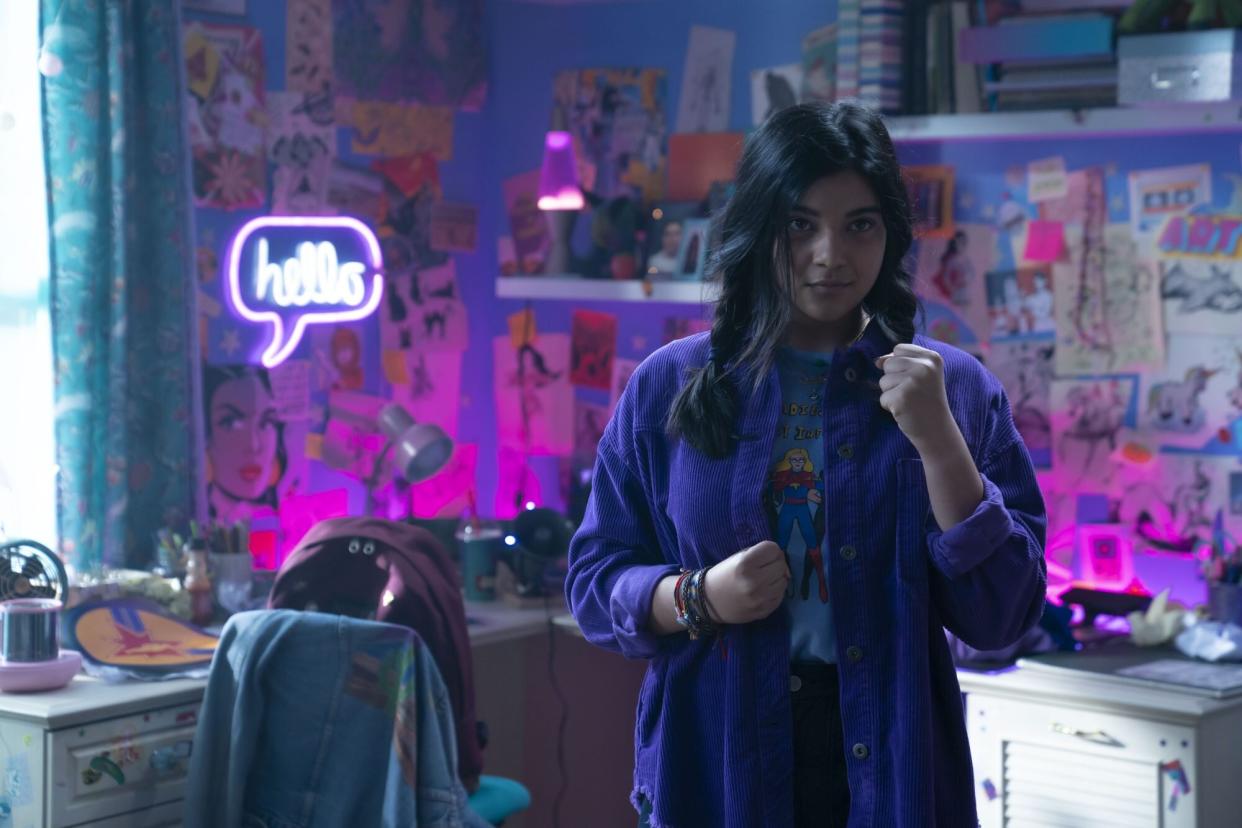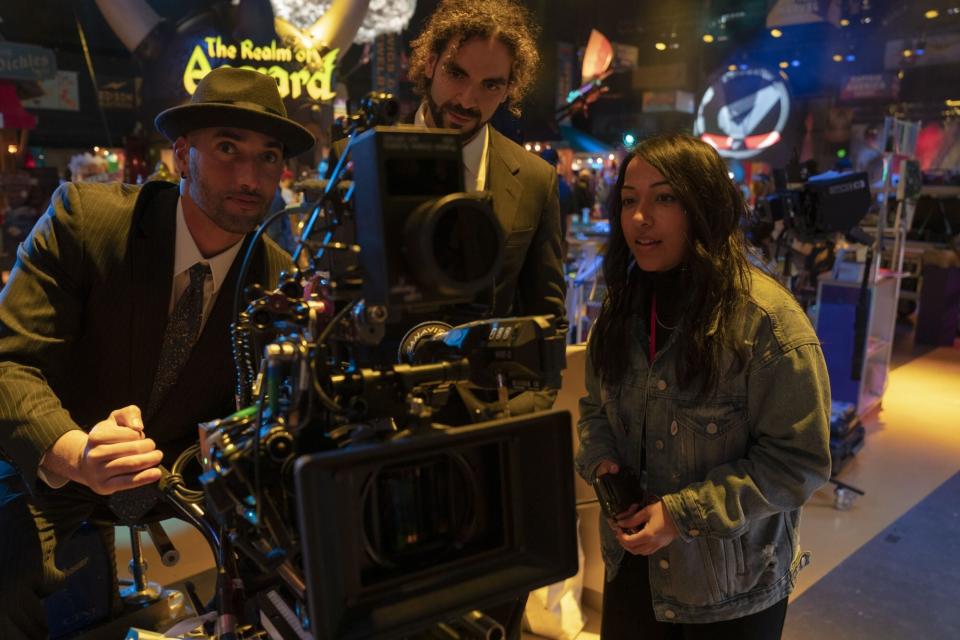'Ms. Marvel' Is a 'Celebration' for Brown Families, Says Co-Creator Sana Amanat

- Oops!Something went wrong.Please try again later.
Daniel McFadden for Marvel Studios
In the first episode of Disney+'s Ms. Marvel, there's a line the title character says, resigned, almost a throwaway—and yet decidedly not.
"Let's be honest, it's not really the brown girls from Jersey City who save the world."
Wrong. My little girl was all of 4 when the Ms. Marvel comic book series debuted Kamala Khan—and because of it, she grew up knowing that she can, in fact, be a superhero and save the world. And of course, we've been watching the Ms. Marvel series on Disney+ together.
Parents caught up with Marvel Comics editor and executive Sana Amanat, who co-created the character and exec-produces the show, to chat about all the work—and the pride—that went into bringing Kamala Khan's world to life.
You first created the comics for Ms. Marvel in 2014. How does it feel to see this come to life this way?
It feels very surreal just because I can't believe it happened. I can't believe it worked. I can't believe they let us do this and then I can't believe the amount of love we've received for this show. I'm very grateful and still processing all of it which is funny because Iman [Vellani, the show's star], says the same thing. She can't believe it. It's wild.
It's truly a feat. As a second generation American of South Asian descent, I feel like I am Ms. Marvel, the kid, but I am also her parents. It captures so much.
That was always the intention with the comics, and the show stays true to that, and I think that's such a rarity—to retain what the comic books did great. We realized the weight and the responsibility of the show that we were making and we took that seriously, which is why this is probably one of the most painful experiences of my life. Because I was not going to settle, I was not going to be okay with, like, library music. I was like, "We're going to make the best show we possibly can with the resources and the time that we have." And the fact that we shot it during a pandemic, and we had so many challenges—like casting via Zoom screen tests. It's a very different thing. Sometimes, you just have to go with your gut. But also, at the end of the day, it's a show that is meant for our community. But really I think all communities are going to connect with the family, because it's really just a really beautiful and simple and joyful story about a family trying to kind of figure out their own relationships together.
It's very much a Marvel show—and yet, unlike any Marvel show or movie we've ever seen.
That is for me inherently Marvel, actually. That's kind of what we wanted. Yes, there's all these heightened sci-fi and superpowers, but this fine balance with this really grounded story. It's the vehicle through which you showcase your character and their strengths, and their vulnerabilities. That was the intention: to tell a really great story about Kamala and her world and her family. And then all those other elements are just sort of a plot device to try to explain them further and bring their relationships together. And Kamala's story always has been so much grounded in her family, and where she's coming from.
And for many of us, it's the first time we're really getting to see a family like that—like ours—on screen.
Yes! If you grew up in a big brown family, it's everyone everywhere all the time. It's your grandparents, your uncles, your aunts, everyone flocking in and out of the house. I grew up like that. I didn't know people coming into my house, and like, "Are we related or not? I'm not sure." But you know what? It was a lot of fun. Kamala has a big community and that is really representative.
And there were so many layers to the story—with the music, the Bollywood references, all the murals in Jersey City coming to life.
Yeah. The Ms. Marvel comics were very quirky comics to begin with—very different from other Marvel comics. Coming into a show where I have my skin in the game was hard. I was very precious about it and we had to figure it out. Like, what's our version of fan fiction? In translating the comics to screen, we really had to play with how things would come to life visually and so we made her into a YouTube artist, making her own version of the comics and cosplaying Captain Marvel. There were so many elements coming together as a melting pot, so to speak. We tried a bunch of different ways, and then we landed on this kind of stop motion style thing. But we wanted to really extend it as an extension of her personality. Kamala looks at the world in this bright and effervescent way, so of course her art and the murals come to life. That just made perfect sense to us.

Daniel McFadden for Marvel Studios Ms. Marvel co-creator and executive producer Sana Amanat (right) on set with directors Bilall Fallah and Adil El Arbi.
Her world view feels so specific. I was recently diagnosed with ADHD, and my kid has it, too. But many cultures, South Asian included, don't address mental health. Was that intentional? Does Kamala Khan have ADHD?
We did kind of discuss it. Actually, it was kind of a top of mind. Like, it does seem like someone who is going through ADHD. Are we gonna tell that story or no? But we didn't pin it down. If we do, we have to be responsible with the way that we tell it, and smart about the way that we tell it. That was not necessarily the intention, but I also understand that that is kind of a part of the way that you experience it.
Let's talk about the parents. As I mentioned, I could completely relate to Kamala the kid. But also saw myself in her parents.
I feel like they're very much harkening to what modern family looks like. We had to be very cautious about not necessarily being too stereotypical, but at the same time showcasing the fact that there are challenges between multiple generations from different cultures. So there's a very natural disconnect, and I don't think there's anything wrong with that. We wanted to make sure that we struck a balance between the protectiveness of Kamala's parents versus that strict Muslim experience. That was always something that we were very mindful of—the fact that the mom is very fearful of what this world is going to do to her daughter, especially because she came to a country that is not hers, that she still feels a little bit like is not fully hers, and she had to really acclimate to. So she doesn't want to get her daughter lost, and they work so hard to be able to build and create a very, a good life for their daughter. Ultimately, we wanted to make this as a story about women, in the multi-generational context.
And then you delved into the grandmother's story, and the history of partition in India and Pakistan, the far-reaching impact of that. I don't think I've ever seen that on screen.
Yes. And the women are the ones who are forgotten in these grand stories, right? I think it's something that could be really unique and special, especially when you're talking about a coming-of-age story for a young woman. And as the season progresses, it keeps going and growing. I'm very excited to see what people will think.
This is also one of the first on-screen representations of the diversity within the diversity, so to speak, especially when it comes to Muslim communities and religion.
Oh, my God! To me, that was exceptionally important. The biggest thing was that we wanted to make sure everyone understood that you can't paint us with one brush, and that we are a multitude of experiences and individuals, especially in the community, which is probably one of the most diverse religions in the world. It's one of the largest religions in the world and will likely be the largest religion in about 5 to 10 years, which is kind of bonkers to me. I do believe that the faith, our Islamic faith, is pluralistic, and I want to celebrate that pluralism, because at the end of the day we have this vast community. We're not a monolith. We should stand together. But we should stand together with our own uniqueness. That is truly like the intention of the show because that's ultimately what we're saying about Kamala. How do you embrace all the aspects that make you who you are?
What has the feedback to the show been like?
The negative reviews have been kind of few and far between. And I'm so used to negative reviews about this character. Like, "How do you talk about religion?" "Who cares about a brown girl?" Okay, then it's not for you. Or: "Oh, you're just hanging the entire show on a culture." And i'm like, "Yeah, you know what? I am. Because that's my life, how I grew up. I went to mosque. I have a huge, brown family. Weddings are like our Super Bowls." I love that stuff. This show is a celebration of our community, of our culture, of our families, and I think that's what is happening. It's when I get letters from parents telling me their kids are watching it and seeing themselves for the first time, that's the stuff that gives me chills.

